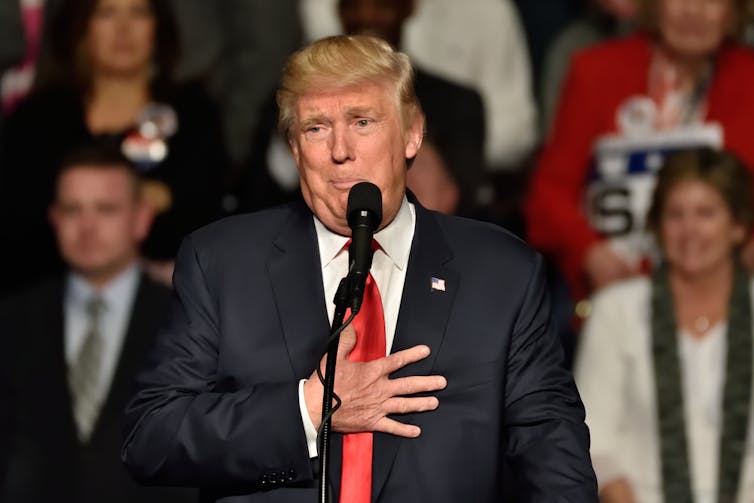
Simon McCarthy-Jones, Trinity College Dublin
World War II opened the gates to hell. In 1948, the nations of the world tried to bolt them shut again. They did so with the Universal Declaration of Human Rights, which recognised the inherent dignity of all people and provided the basis on which international human rights law was built. When this bolt was subsequently loosened in countries such as Cambodia, Rwanda and Bosnia, catastrophe ensued.
President Donald Trump could be viewed as toying with this bolt again through his repeated use of humiliation – of individuals, groups and nations. Although this tactic may have benefited him, humiliation is dangerous for both the humiliator and the humiliated. As Nelson Mandela noted, there is nobody more dangerous than one who has been humiliated. Indeed, humiliation has been argued to be the most underappreciated force in international relations.
Not only is humiliation a violation of human dignity, its consequences are unpredictable. The “humiliation” of Germany following World War I arguably led, in part, to World War II. President Trump’s use of humiliation should hence be of concern to both America and the world.
Restoring face
Crucial to Trump’s victory in the 2016 US presidential election were white, working-class voters. While it is not yet entirely clear why so many of these voters supported him, Trump’s appeal to their economic interests and promise to restore their social status may both have been important. One argument is that Trump rode a wave of anger in white working-class voters, which resulted from their feelings of humiliation. This humiliation is proposed to have stemmed from a loss of both financial and cultural status.
Trump vowed to halt the humiliation of this group. He also vowed to end what some of these voters saw as America’s humiliation. In both cases, Trump turned the tables by humiliating the perceived humiliators.
The list of those deemed responsible was long and distinguished. Candidate Trump targeted men and women, Republicans and Democrats, Americans and non-Americans, individuals and corporations, the powerful and the vulnerable.
President Trump continued this approach. He stands accused of running the White House as a reality show, using tactics of humiliation for ratings. Former FBI Deputy Director Andrew McCabe described the “extended humiliation of my family and me that the administration, and the president personally, have engaged in”.
President Trump has also humiliated his former attorney general, his cabinet and other world leaders. He has even attempted to humiliate entire countries.
An emotion of mass destruction
Humiliation can lead to war and conflict. Hitler rose to power on a promise to dispel the humiliation Germany had suffered after World War I. Henry Kissinger’s explanation of why the US did not foresee the Yom Kippur war was that “our definition of rationality did not take seriously the notion of [Egypt and Syria] starting an unwinnable war to restore self-respect”. Militant Islamists use feelings of humiliation to promote jihad.

On the face of it, this is surprising. Humiliation often leads to shame, which is associated with a desire to withdraw, hide or submit. But in individualistic cultures – such as the US – experiencing shame often leads to anger.
This is because in individualistic cultures shame is to be avoided. It signals flaws and dependence upon others’ opinions. To avoid the appearance of flawed character, shame is often converted to the more acceptable emotion of anger. In other countries, such as Japan, shame is less likely to be transformed into anger.
Some individuals who are shamed will explode with humiliated fury. This is more likely if the person has high levels of narcissism. Such people have grandiose views of themselves, a strong sense of entitlement, and seek to exploit others. They are strongly motivated to maintain their self-esteem and deflect shame by placing blame on others, whom they rage against.
Of course, shame isn’t necessary to feel anger after humiliation. If you believe that what was done to you was not deserved you will likely feel anger without having to suffer shame beforehand.
The results of humiliation-induced anger are also unpredictable. They may help contribute to positive activist movements, such as Black Lives Matter and #MeToo. However, it can also yield genocide, mass-killing, and terrorism.
Trump’s use of humiliation has the potential, then, to trigger an extreme and unpredictable reaction, including on the global stage. It also risks setting a social norm in which humiliating people is acceptable. All this undermines the concept of inherent human dignity and risks a conflict in which people are accorded no inherent value.
Fighting for dignity
Trump is not alone in humiliating people. Neither are parts of the white working-class the only people who have felt humiliation. Indeed, the main focus of Hillary Clinton’s identity-based 2016 election campaign was to remedy the deep seated systematic humiliation experienced by many women and African-Americans.
But why are so many people either feeling humiliated or humiliating others? Humiliation is a weapon of hierarchy. Part of the answer hence lies in the power disparities present in the hierarchical structure of American society. Trump’s policies will only increase these.
Dignity will not be restored through tax cuts and economic growth alone. Americans’ trust in their fellow citizens and government is low. Inequalities in income and education levels are high. People will not cease to feel humiliated until communities are rebuilt both financially and socially.
The term “dignity” does not appear in the US Constitution. Yet, over the past two centuries, Supreme Court Justices have used the term in more than 900 opinions. America is already on the side of dignity. It just needs to ensure it. For its own sake and the world’s.
Simon McCarthy-Jones, Associate Professor in Clinical Psychology and Neuropsychology, Trinity College Dublin
This article is republished from The Conversation under a Creative Commons license. Read the original article.
